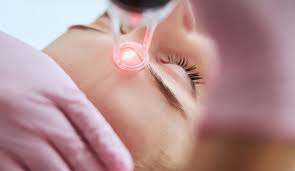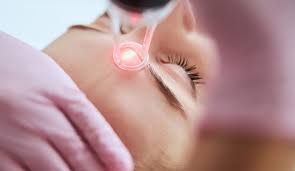In recent years, laser treatment has become a groundbreaking solution in the field of ophthalmology, offering patients a way to improve vision and treat various eye conditions. From refractive errors like nearsightedness to complex retinal issues, laser therapy (العلاج بالليزر)has revolutionized vision correction, providing a non-invasive and highly effective alternative to traditional methods. This article explores the role of laser treatment in eye health and its impact on vision correction.

What is Laser Treatment for Eye Health?
Laser treatment for eye health involves the use of focused light beams to treat various eye conditions. The procedure works by targeting specific tissues within the eye with laser light energy, which can reshape the cornea, remove cataracts, or treat retinal disorders. Different types of lasers, such as excimer lasers, femtosecond lasers, and YAG lasers, are used for different purposes in the field of ophthalmology.
Common eye conditions treated with laser treatment include:
- Refractive errors (such as myopia, hyperopia, and astigmatism)
- Cataracts
- Retinal disorders
- Glaucoma
- Corneal disorders
Types of Laser Treatment for Eye Health
1. Laser Vision Correction (LASIK and PRK)
One of the most well-known laser treatments for eye health is LASIK (Laser-Assisted in Situ Keratomileusis), a procedure used to correct refractive errors like nearsightedness, farsightedness, and astigmatism. During LASIK, a laser is used to reshape the cornea, allowing light to properly focus on the retina and improving vision.
PRK (Photorefractive Keratectomy) is another laser procedure for vision correction that works similarly to LASIK but without the creation of a corneal flap. It’s often recommended for patients with thinner corneas or other specific conditions.
Both LASIK and PRK are highly effective and provide long-lasting vision improvements, making them popular choices for patients looking to reduce or eliminate their dependence on glasses or contact lenses.
2. Laser Cataract Surgery
Cataracts, a clouding of the natural lens in the eye, are a common cause of vision impairment, especially among older adults. Laser-assisted cataract surgery is a highly precise and minimally invasive procedure that uses a femtosecond laser to soften and break up the cataract before it is removed. The laser allows for greater accuracy in shaping the corneal incision, improving the precision of the procedure and reducing recovery time compared to traditional cataract surgery.
3. Laser Treatment for Retinal Disorders
Laser therapy is also used to treat retinal conditions, such as diabetic retinopathy and macular degeneration. In these procedures, a laser is used to either seal leaking blood vessels in the retina or to create small burns that help prevent further damage to the retina. This treatment can slow the progression of retinal disorders and help preserve vision.
4. Laser Treatment for Glaucoma
In the case of glaucoma, where increased intraocular pressure can damage the optic nerve and lead to vision loss, laser treatment can be used to reduce pressure in the eye. Selective Laser Trabeculoplasty (SLT) is a type of laser surgery that helps improve the drainage of fluid from the eye, lowering intraocular pressure and preventing further damage.
Benefits of Laser Treatment for Eye Health
1. Precision and Accuracy
One of the primary benefits of laser treatment in eye health is its precision. Lasers can target specific areas with great accuracy, ensuring minimal disruption to surrounding tissues. This high level of precision allows for effective treatment with fewer complications.
2. Minimally Invasive
Unlike traditional surgical procedures, laser treatment is minimally invasive. Most eye laser procedures involve no cuts or stitches, which means reduced risk of infection and shorter recovery times. This non-invasive nature of laser treatment makes it an attractive option for many patients.
3. Quick Recovery
Laser eye treatments typically offer faster recovery times compared to traditional surgery. Many patients experience improved vision within hours or days of the procedure, and they can resume normal activities soon after. This makes laser treatment(العلاج بالليزر) an appealing option for those with busy lifestyles.
4. Long-Lasting Results
Laser treatments, such as LASIK and cataract surgery, provide long-lasting results. In many cases, patients experience a significant improvement in vision that lasts for years, with little to no need for corrective eyewear. This can greatly enhance the quality of life for individuals who rely on glasses or contact lenses.
What to Expect During and After Laser Treatment
1. During the Procedure
The procedure will vary depending on the type of laser treatment being performed. For vision correction procedures like LASIK, patients will be given numbing drops to prevent discomfort. During the treatment, a laser will be used to reshape the cornea or correct the refractive error. The procedure typically takes only a few minutes per eye.
For cataract or retinal treatments, the patient may receive local anesthesia and will be monitored throughout the procedure. These procedures also generally take a short amount of time, and patients are usually awake during the treatment.
2. After the Procedure
After laser treatment, most patients experience little to no discomfort. Some may notice mild dryness or temporary vision blurriness, but these side effects are usually temporary and resolve within a few days. Patients are often advised to rest for a short period and avoid strenuous activities for a few weeks.
For vision correction treatments, follow-up visits with your ophthalmologist are necessary to ensure that the eyes are healing properly. Cataract surgery patients will also need regular check-ups to monitor the success of the treatment and ensure that no complications arise.
Conclusion: A Revolution in Eye Health
Laser treatment has revolutionized the field of ophthalmology by offering precise, non-invasive solutions to a wide range of eye health issues. From vision correction to the treatment of cataracts, retinal disorders, and glaucoma, laser treatment continues to improve the quality of life for patients by enhancing vision and reducing reliance on glasses or contact lenses.
If you are considering laser treatment for your eye health, consult with an experienced ophthalmologist to determine the best option for your needs. With its many benefits, laser therapy is undoubtedly changing the landscape of vision care, providing patients with safe, effective, and long-lasting solutions for better eye health.

